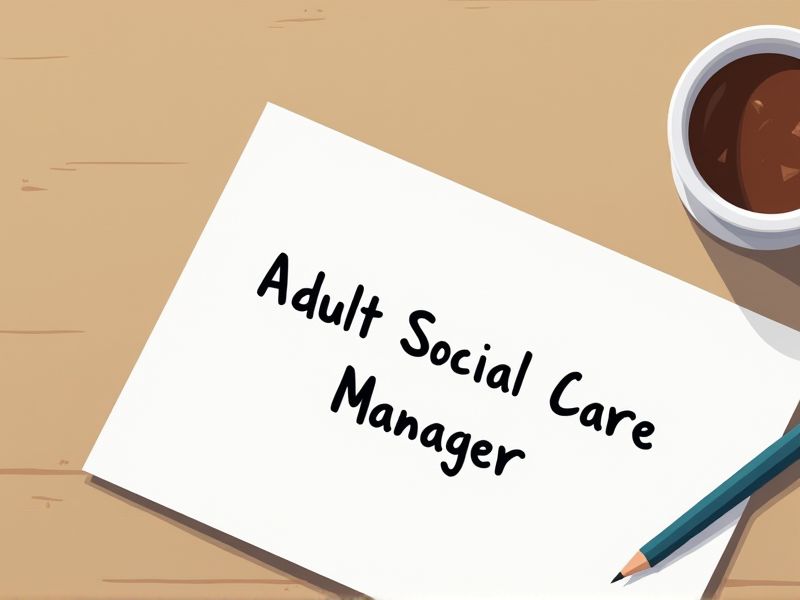
An Adult Social Care Manager shoulders the responsibility of ensuring quality care and compliance with regulations, necessitating specific certifications that validate their expertise. Regulations in the healthcare sector are stringent and continuously evolving, demanding that managers stay informed and skilled. Certifications provide assurance of proficiency in areas such as healthcare management, legal requirements, and ethical practices. Below are essential certifications that might be required to excel as an Adult Social Care Manager.
Care Certificate
The Care Certificate ensures that Adult Social Care Managers meet consistent standards in fundamental areas, enhancing the quality of care provided. This baseline knowledge promotes a safer care environment, reducing the risk of harm to clients. Demonstrating competency through the Care Certificate can boost trust and confidence among team members and service users. It also serves as a framework for staff development, aligning with the evolving needs of the care sector.
NVQ Level 5 in Health and Social Care Management
The NVQ Level 5 in Health and Social Care Management equips adult social care managers with essential leadership skills necessary for effectively managing teams. This qualification ensures that managers have a thorough understanding of policies and regulations, aiding compliance and quality care delivery. It also provides in-depth knowledge on safeguarding practices, which is critical for protecting vulnerable individuals in care settings. By gaining this qualification, managers can improve service efficiency, resulting in better outcomes for both staff and service users.
Diploma in Leadership for Health and Social Care
An Adult Social Care Manager requires a Diploma in Leadership for Health and Social Care to ensure they are equipped with essential management and leadership skills tailored to the unique challenges of health and social care environments. The curriculum often covers critical areas like strategic decision-making, safeguarding, and stakeholder collaboration, which are vital for maintaining high standards of care and compliance. With the complexities of managing diverse teams and navigating regulatory frameworks, this qualification provides a structured approach to developing competencies necessary for effective care management. The diploma supports career advancement by aligning with industry standards and demonstrating a commitment to professional growth in the health and social care sector.
Certificate in Safeguarding Adults
The Certificate in Safeguarding Adults equips Adult Social Care Managers with essential knowledge to recognize and address signs of abuse and neglect effectively. Organizations adhere to legal standards, and this certification ensures compliance with safeguarding policies, reducing liability risks. By understanding safeguarding frameworks, managers can create safer environments for adults in care settings. Enhanced competency in safeguarding enhances trust among service users, their families, and regulatory bodies.
Mental Capacity Act (MCA) Certification
Mental Capacity Act (MCA) Certification ensures that Adult Social Care Managers understand legal responsibilities when making decisions for individuals who cannot make decisions for themselves. This certification provides managers with the knowledge to assess mental capacity effectively, reducing the likelihood of legal challenges or disputes. It promotes ethical decision-making in line with individual rights and safeguards against potential abuses of power. Certification helps maintain professional standards in adult social care, leading to better outcomes for service users.
Infection Prevention and Control Certification
Infection Prevention and Control Certification equips Adult Social Care Managers with essential skills to mitigate health risks and ensure a safe environment for clients and staff. These certifications provide managers with up-to-date knowledge on infection control practices, which is crucial for adhering to evolving health regulations. Effective infection control minimizes the spread of infectious diseases, protecting vulnerable populations in care settings. Certification also enhances professional credibility, instilling confidence among clients, families, and regulatory bodies.
Health and Safety in Care Settings Certification
Gaining Health and Safety in Care Settings Certification equips Adult Social Care Managers with the knowledge to reduce workplace hazards, ensuring a safer environment for both staff and residents. Familiarity with health and safety protocols minimizes risks of accidents and injuries, leading to improved operational efficiency. Certification instills confidence among clients and families, potentially increasing trust and satisfaction with care services. Regulatory compliance is vital; having certified managers helps care facilities meet legal standards, avoiding potential fines and penalties.
First Aid Certification
First aid certification equips an Adult Social Care Manager with essential skills to handle medical emergencies, ensuring the well-being of both staff and clients. Understanding first aid procedures reduces response time, minimizing the severity of incidents and enhancing overall care quality. It instills confidence in the team, promoting a safer working environment that aligns with regulatory standards. Compliance with health and safety regulations often mandates such certification, reflecting the organization's commitment to high safety standards.
Dementia Care Certification
Adult social care managers, possessing Dementia Care Certification, can improve the quality of life for individuals with dementia by implementing evidence-based practices. This certification ensures that managers understand the neurological complexities associated with dementia, leading to more tailored care strategies. The training enhances communication skills necessary for effectively interacting with patients and their families, reducing potential stress for both parties. Certified managers may also indirectly decrease healthcare costs by mitigating hospital readmissions through increased preventive care and management.
Equality, Diversity and Inclusion Certification
The Equality, Diversity, and Inclusion Certification equips Adult Social Care Managers with crucial skills to create an inclusive environment, enhancing staff morale and productivity. Training in these areas helps managers recognize and address unconscious biases, fostering fair treatment for all individuals. By understanding diversity, managers can tailor care practices to meet varied cultural, social, and individual needs, improving service quality. Certification also demonstrates a commitment to legal and ethical standards, reducing the risk of compliance issues within organizations.
Summary
By obtaining relevant certifications, you can significantly enhance your knowledge and skills in managing adult social care. Certification often leads to increased credibility and trust, making you a more desirable asset within the organization. As you implement certified practices, improvements in service quality and compliance with regulations tend to increase. Over time, such credentials can also create opportunities for career advancement and higher salary potential.
